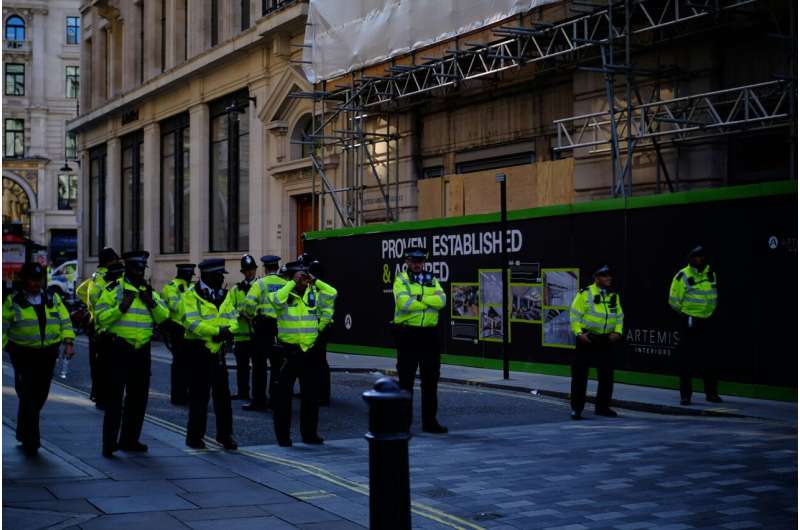This article has been reviewed according to Science X's editorial process and policies. Editors have highlighted the following attributes while ensuring the content's credibility:
fact-checked
trusted source
written by researcher(s)
proofread
Southport riots: Why social media's role in unrest is overblown

More than 100 people have been arrested in riots following the fatal stabbing of three young girls in an attack on a dance class.
Suspected supporters of the far-right English Defense League violently clashed with police officers after a peaceful vigil in Southport on Tuesday, despite pleas for calm from the victims' families.
The prime minister, Keir Starmer, condemned the rioters for their "violence and thuggery." Hundreds of far-right rioters attacked a local mosque, looted nearby premises, and injured more than 50 police officers. Further riots occurred in London and Hartlepool on Wednesday, with dozens arrested.
Politicians, including Southport MP Patrick Hurley, have suggested that the violence was due to "lies and propaganda" spread on social media after the attack about the identity of the alleged attacker.
A 17-year-old male has been charged with three murders and ten attempted murders. Online platforms like TikTok and X (formerly Twitter) were quickly flooded with false information about the perpetrator's identity. At the time, police had only confirmed that he was born in Cardiff. But many posts included an incorrect name, and claimed incorrectly that he was a Muslim asylum seeker who had arrived in the UK via small boat in 2023.
Investigative journalist Katharine Denkinson was among those to trace the source of this misinformation back to a website calling itself Channel3 Now, which appears to share possibly AI-generated content, and whose origins are unclear.
Researcher Marc Owen Jones illustrated how right-wing influencers used the attack to promote an anti-immigrant agenda. There were an estimated 27 million impressions for posts claiming that the attacker was Muslim, a migrant or a refugee—but far fewer denouncing the speculation. But to what extent are such posts to blame for violence?
Social media and civil unrest
Online platforms have often been blamed for civil unrest, including after the stabbings in a Sydney mall in April 2024.
We are also now approaching the 13th anniversary of the English riots where some politicians called for the temporary shutdown of Facebook and Twitter to quell the violence. But a study analyzing millions of related tweets found that social media was not used to organize or incite the riots.
Back then, I was among many to argue that it was expedient for politicians to blame social media for civil unrest rather than acknowledge the injustices and political tensions that underpin such violence.
Last summer, French president Emmanuel Macron proposed that access to platforms such as TikTok be restricted when riots are out of control.
The implication is that the rapid spread of unverified, false and inflammatory content online is a driver of civil unrest. What is certainly true is that social media amplifies content that inflames tensions—in already divided societies.
Sectarian violence in countries such as India and Myanmar has been attributed to hate speech and misinformation hosted by online platforms. Facebook apologized for the "very real human rights impact that resulted" from the use of its services to incite violence in Sri Lanka in 2018.
In the UK, divisions over migration and asylum have been provoked by inflammatory language from politicians. It is no surprise that other violent demonstrations have taken place at asylum hotels and detention centers in recent years.
We can't ignore the role that political rhetoric plays. Newly elected MP Nigel Farage posted a video in reaction to the Southport stabbings, in which he asked whether the police were deliberately withholding information from the public, and questioned whether the incident was terror-related. He has been criticized for stoking up the situation and giving legitimacy to the other unsubstantiated rumors about the attacker.
Simmering tensions
The impact of social media on incidents of civil unrest is often overstated. There is little evidence that misinformation persuades law-abiding citizens to engage in rioting. This is corroborated by my research into social media and contentious parades and protests in Northern Ireland.
From the 2013 union flag protests to the anti-Northern Ireland protocol rallies in April 2021, social media was used to organize loyalist street protests that led to clashes with police.
In both cases, online platforms were used to share rumors, mis- and disinformation that inflamed tensions. Yet, most of the online activity I have analyzed over the past decade followed rather than preceded riots. And it was dominated by distant onlookers, not those able to influence events on the ground.
The violence in response to the Southport killings shows how online platforms can expose people to false information and make it harder to stop simmering tensions from escalating.
But the reality is that the business model and legal status of these sites means that they hold no editorial responsibility for the content they host. The most controversial and inflammatory content typically travels the furthest and fastest online, generating revenue for tech companies. In other words, they have no real incentive to stop it spreading.
We can't blame social media on its own without looking at the root of these tensions in the first place. It is expedient for politicians to blame online platforms rather than acknowledge their role in producing a toxic political discourse in relation to asylum seekers and immigration.
If political leaders are serious about avoiding further violence, they should start by moderating their own language.
Provided by The Conversation
This article is republished from The Conversation under a Creative Commons license. Read the original article.![]()




















